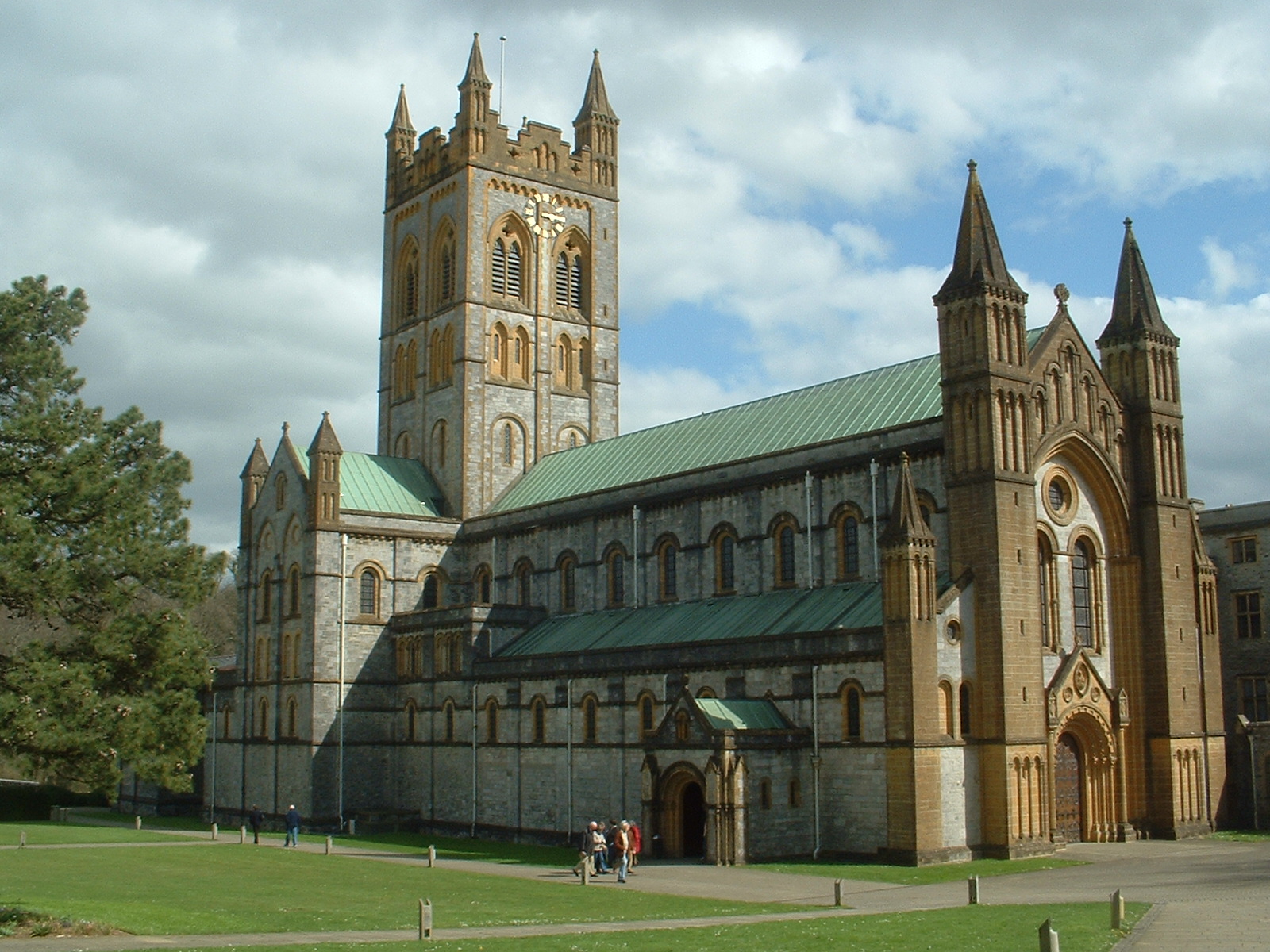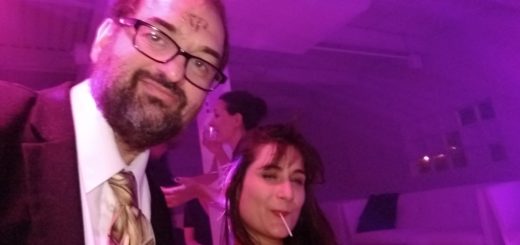Buckfast Abbey
 I am probably the only Jew in Brooklyn with an uncle who is a monk and a priest at Buckfast Abbey, but that is my confused family heritage. That was apparently his ambition from childhood, when he read a pamphlet about Buckfast Abbey. His mother, my grandmother, was apparently not content initially with this ambition, but eventually became reconciled to it, even enthusiastic for it in her older age.
I am probably the only Jew in Brooklyn with an uncle who is a monk and a priest at Buckfast Abbey, but that is my confused family heritage. That was apparently his ambition from childhood, when he read a pamphlet about Buckfast Abbey. His mother, my grandmother, was apparently not content initially with this ambition, but eventually became reconciled to it, even enthusiastic for it in her older age.
But as a boy I had no idea of the family politics. All I knew was that my uncle Joe was Brother James. Oxford educated by the Church. We always sang songs on long car trips, but when we took him to Dublin for Uncle Harry’s wedding, we could only sing hymns so he could join in. I don’t know how many times we sang ‘Lord of the Dance’.
When I was fourteen, my family had “glandular fever”, whatever that was. I couldn’t go home from boarding school for fear of infecting all the other boys when I returned.
So on this vacation, I trekked across the south of England to Exeter by train. An adventure that I recalled fondly reading Harry Potter to my children many years later, refreshments car and all. Eventually I reached my destination, and my uncle Brother James. his name in the monastery. Brother Joseph was the driver of the ancient Deux Chevaux Citroën that would take us from the station.
What I was not prepared for was facing my mortality at the age of fourteen. These monks lived a life dedicated to service to God, and I was a miserable sinner. As we flew up and down the startlingly steep valleys, they clearly had no fear of facing their Maker. I had less faith in the rickety contraption that carried us, with an umbrella handle for a gear shift, and little to speak of for brakes.
Miraculously we reached the abbey, constructed by German Benedictine monks in the 1920s to restore the influential abbey of the 1500s. Uncle Joe conducted my shaken but strangely invigorated self to his office. He had complained to one of his friends at the the abbey about how the invaluable bequests that the abbey received were mistreated, uncatalogued and unreviewed. When his friend became lord abbot, of course his reward and punishment was to be appointed librarian and curator of these bequests. And to pay for my keep for the week, I would do my part in cataloging new acquisitions.
His office was in the one remaining tower of the original monastery. Rough stones poked out of the walls, more a lair than an office, with a wall of ancient books. I was completely the interloper from the twentieth century, as Joe regaled me in robes unchanged for centuries – I was out of place, not he.
The Benedictine Rule is one of moderation. So in Joe’s office the first course of business was a pint of the strong beer that the brothers brewed for internal consumption only. Naturally as a fourteen year old in England in the 1970s, I smoked, so Joe offered me a cigarette. John Player Navy Cut, the strongest cigarettes available in England. As novices, the monks were limited to fourteen cigarettes a day, so they all smoked the most potent ones available, and continued after they took their vows.
Suitably intoxicated, Joe started to educate me in the intricacies of classifying books. How to recognize the hand binding that would mark a truly valuable book that I should bring straight to him. The Dewey decimal system I was thankfully familiar with, I could at least contribute for my week of labor.
I am still not sure how I ever left the surety of my novice’s cell and the quiet of the refectory as we ate to the reading of a biography of Admiral Fisher in silence. The conversations in the rectory, one in which a monk seemed quite happily non-secular, proposing to me that each race had its own religion to which it would inevitably return. Today I would call him out on these inherent contradictions, did he mean that Britain would inevitably return to worship the Goddess? But what I secretly heard was that it was inevitable that I would find the Jewish faith, it was in my blood.
Religion has always been tricky for me, and this was a way point on my journey. I had never found in myself any stirring for the legally proscribed protestations of faith from my headmaster at morning assembly. The mouthings about the only begotten Son of God dying for our sins simply made no sense to me. Why would God snip off a part of Himself, torture it, crucify it, then forgive us? Couldn’t He (definitely in the C. of E. a He) just go ahead and forgive us?
And if our sins were forgiven, then why were they still sins? Christ had died so long before I was born, how could I still be a sinner still? Or have original sin?
To me the whole thing was a house of cards that could only come tumbling down. I was angry at anyone who supported the lies of the established cHurch. Before I spoke the language of patriarchy and oppression my intuition sensed the enemy.
So one Christmas Eve with no warning to them I refused to join my family on our annual church visit for midnight mass. Perhaps it was as much a rebellion against my father as against the patriarchal establishment. He certainly perceived it so, and blustered in fury at my refusal. I did not give him my reasoning, not even that I did not believe, I set it up as simple defiance. And my mother in her cajoling played the personal card not the religious one, did I not see how important this was to him, could I not come in the name of family unity.
But I did manage eventually to express that I was an atheist. I remember an assistant head teacher being taken aback by this, saying how it was unusual for someone to come right out say this. Perhaps so, I was eleven at the time, and a softly defined Christianity was ever present. I even sang hymns in the choir at daily assembly and twice weekly practice, because instead of sitting cross legged on the bare floor, we got to sit in comfortable chairs like the staff and upper classes. Endless practice until we had mastered the Passion of St. Luke, a beautiful work of music (formerly attributed to Bach) that I took great pride to perform in concert. The Latin words of praise were just notes for me to sing together with my friends.
But the perfect lawns and hedges of Buckfast Abbey were intuitively a turning point for me. Here was faith in action, the brothers worked and lived communally, finding contentment not in service to the establishment but to each other and the Rule of St. Benedict. I had yet to read that religion was the opiate of the masses, but that was surely its place outside the bounds of the abbey. Not so here.
After Buckfast, I evolved in my views. I dabbled in Kabbalah, or at least the westernized version of A.E. Waite. I never believed in the magic of my vaguely hippie friends, but perhaps in the magick of spiritual journeys through meditation on the paths between the sephirot, through the major arcana of the Tarot cards.
And I slowly discovered Judaism. First through a drinking friend in college, who brought me to the cheap and nourishing JSoc kosher lunches. I was an odd bird, listening along to the prayers that I did not understand but were second nature to the other students who had grown up with them.
Insufficiently rooted, I fell into depression and left university half way through. Perhaps inspired by reading Leon Uris’s Exodus, I sought a new life in Israel. I would be a secular Jew in a land of Jews. And escape the depression of Maggie Thatcher’s wasteland of England. To her “there is not alternative”, I had an escape hatch.
There is no religion in life on a kibbutz as a volunteer. I did not notice any marking of the High Holy Days. Even when I went to the largely Jewish ulpan to learn Hebrew, the push to “make aliyah” or immigrate permanently to Israel was purely secular. Religion remained dormant for me.
But when I came with my American wife to New York, life stirred. I learned from her the beginnings of the prayers, and though we did not light candles we did attend High Holiday student services. She professed to not believing, but to finding comfort in the rituals of her youth. I could not understand how this could be, but was grateful for her guidance in the prayers.
Eventually we found our way to Brooklyn, and to an egalitarian Conservative synagogue. Conservative in Judaism means that it conserves the traditional rituals, Egalitarian meant that in the great split as to whether women should be allowed to participate as equals in services, this congregation had opted for the liberal position. We had found our place. I took adult education classes together with others, all women, who had come late to Judaism, either through marriage or through lack of early education.
But I failed to instill in my children any sense of the divine. We sent them to Hebrew school, which they hated and quit as soon as they had their bat mitzvahs. And we fell away from attending schul ourselves. In one debate with them, they were insistent atheists, and told me that I was one too. I described for them my belief in God not as a magician on a mountain top deciding who is naughty or nice and throuing thunderbolts, but as a simple observation that Nature does exist, that the world is and continues to be in being. Perhaps as a friend once said, I believe in the Force. Perhaps this is Spinoza’s God, I am no philosopher or theologian. Their response was “we told you, you are an atheist!”
So I continue. A secular Jew in New York, one among many, with vague stirrings of religion. Three thousand miles from the beauty and calm of Buckfast Abbey.
